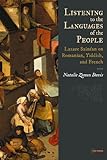Listening to the languages of the people : Lazare Sainéan on Romanian, Yiddish, and French / Natalie Zemon Davis.
Material type: TextPublication details: Budapest ; New York : Central European University Press, (c)2022.Description: 1 online resource (x, 188 pages) : illustrationsContent type:
TextPublication details: Budapest ; New York : Central European University Press, (c)2022.Description: 1 online resource (x, 188 pages) : illustrationsContent type: - text
- computer
- online resource
- 9789633865941
- 9633865948
- P85 .L578 2022
- COPYRIGHT NOT covered - Click this link to request copyright permission: https://lib.ciu.edu/copyright-request-form
| Item type | Current library | Collection | Call number | URL | Status | Date due | Barcode | |
|---|---|---|---|---|---|---|---|---|
 Online Book (LOGIN USING YOUR MY CIU LOGIN AND PASSWORD)
Online Book (LOGIN USING YOUR MY CIU LOGIN AND PASSWORD)
|
G. Allen Fleece Library ONLINE | Non-fiction | P85.126 (Browse shelf(Opens below)) | Link to resource | Available | on1329431260 |
Browsing G. Allen Fleece Library shelves, Shelving location: ONLINE, Collection: Non-fiction Close shelf browser (Hides shelf browser)
Includes bibliographies and index.
Cover -- Front matter -- Title page -- Copyright page -- Contents -- Note on Transliteration -- Acknowledgments -- Introduction -- Part One: Romania -- Early Years: Studies and Friendships -- The Field of Linguistics -- First Publications -- The Science of Judaism: Advancing Emancipation -- Semasiology -- Paris, Gaston Paris, and the Jours d'Emprunt -- Leipzig and the Neogrammarians -- Research on Yiddish -- The Dialectological Study of Judeo-German -- Spreading the Word on Yiddish -- B.P. Hasdeu, Anti-Semitism, and Jewish Relations -- University Lectures and New Books
V. A. Urechiă and the First Rejection of Naturalization -- Favorable Reviews and Marriage -- Basmele Române -- The Basmele Wins a Prize -- Second Defeat of Request for Naturalization -- Self-Defense and Studies in Folklore -- The Dicționar Universal -- Non-Zionist Jew and His Circle of Friends -- Paris, London: Gaster and Zionism -- Paris: Nordau and Zionism -- The Rejection of Zionism, the Dreyfus Affair -- Baptism and Its Consequences -- The Oriental Influence on Romanian Language and Culture -- Șăineanu and Other Jews -- The Last Months: Publication and Defeat
Repairing and Describing His Life: The Philological Career -- Part Two: France -- The New Émigré -- Living and Making a Living -- Some Translations -- Judeo-German for the French Scholar -- The Popular Languages of France -- Rabelais -- Les Sources Indigènes and Disappointment -- Summing Up -- Languages and "the People" in the 1920s and 1930s -- Two Jewish Critics on Sainéan's Life -- Abbreviations -- Bibliography -- Index -- Back cover
"This tale of great achievements and great disappointments offers a fresh perspective on the interplay between scholarship and political sentiment in the late nineteenth and early twentieth centuries. Lazăr Șăineanu (1859-1934), linguist and folklorist, was a pioneer in his native Romania, seeking out the popular elements in culture along with high literary ones. He was the first to publish a study of Yiddish as a genuine language, and he uncovered Turkish features in Romanian language and customs. He also made an index of hundreds of Romanian folktales. Yet when he sought Romanian citizenship and a professorship, he was blocked by powerful figures who thought Jews could not be Romanians and who fancied the origins of Romanian culture to be wholly Latin. Faced with anti-Semitism, some of his friends turned to Zionism. Instead he tried baptism, which brought him only mockery and shame. Hoping to find a polity to which he could belong, Șăineanu moved with his family to Paris in 1900 and became Lazare Sainéan. There he made innovative studies of French popular speech and slang, culminating in his great work on the origins of that language. Once again, he was contributing to the development of a national tongue. Even then, while welcomed by literary scholars, Sainéan was unable to get a permanent university post. Though a naturalized citizen of France, he felt himself a foreigner, an "intruder," into his old age"--
COPYRIGHT NOT covered - Click this link to request copyright permission:
There are no comments on this title.







